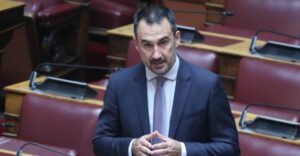A university professor and well-known gynecologist with a private fertility clinic has been assessed an additional tax of €2.3 million for a twelve-year period due to the inability to explain the source of his income from 36 bank accounts. However, €1.7 million of this amount was statute-barred, leaving a final tax difference of €441,000, which, with penalties, amounts to €1 million.
The Economic Crime Prosecutor provided the head of the Large Wealth Taxpayers Control Center (K.E.F.O.M.E.P) with a digital disc (CD) containing data from the gynecologist’s bank accounts for the years 2000-2012. The CD included data (deposits, withdrawals, etc.) from four banks and 36 accounts held by the gynecologist with six additional co-holders, including his wife, two children, sister, brother, and mother.
Following an order from K.E.F.O.M.E.P., an income audit was conducted for the years 2001-2013. It was found that during these twelve years, the gynecologist filed joint tax returns with his wife for income from salaried services and freelance medical practice.
The tax authorities discovered through the ELENXIS system of the Ministry of Finance that the gynecologist was also the legal representative, manager, and sole partner of a single-member Limited Liability Company (LLC). The audit revealed that the source of the funds in the 36 bank accounts could not be determined. Consequently, the tax authorities treated these funds as undeclared income.
The gynecologist was asked to provide any documentation, such as bank statements, lease agreements, real estate transactions, stock market transactions, etc., to justify the source of the credits in his bank accounts for the years 2001-2013. He was also requested to clarify whether these amounts had been taxed or legally exempted from tax. However, he did not provide evidence to prove the taxation or legal exemption of these amounts.
Since the source of the funds in the bank accounts could not be determined, the tax authorities proceeded with corrective tax assessments, including income tax, additional tax for inaccurate income statements, solidarity contribution discrepancies, and additional tax for inaccurate solidarity contribution statements, totaling approximately €2,327,980.
The doctor appealed, arguing that the statute of limitations had expired for most of the audit period and provided evidence justifying the source of part of the bank deposits, approximately €150,000. It was determined that for the years 2001-2010, the statute of limitations had indeed expired, and tax assessments were issued for the two-year period 2011-2013, amounting to €557,000.
The gynecologist then took the matter to court, seeking to annul the tax assessments, arguing that not all income from the company’s activities was deposited into the company account, as it essentially functioned as a sole proprietorship, and many of the company’s gross revenues did not pass through the company account but through his personal bank accounts.
The Administrative Court of Appeal of Athens noted that the audit and the detailed bank account movements revealed that the deposit amounts exceeded the annual turnover of the company. The court emphasized that the issue of unaccounted increases in assets from unexplained credits in bank accounts should be judged solely based on the evidence provided for each disputed credit and not conclusively.
The court found that the gynecologist did not provide sufficient evidence, and thus the source of the deposits could not be determined. As a result, the increase in his assets was deemed unexplained, and the taxable income for the years 2001 to 2013 was calculated, including the amounts for extraordinary contributions and solidarity contributions.
The gynecologist then filed an appeal with the Council of State, challenging the appellate court’s decision. The Council of State, led by Vice-President Michalis Pikrammenos and Councilor Nikos Sekkeroglou, agreed with the Independent Authority for Public Revenue (AADE) that during a three-year period, deposits totaling €557,000 were made into the gynecologist’s bank accounts without an identifiable source, leading to an additional tax assessment of €441,000, which, with penalties, currently amounts to approximately €1 million.
The Council of State rejected the gynecologist’s claim that the Administrative Court of Appeal incorrectly accepted that the remaining annual gross revenues of the LLC, not deposited into the company’s bank account, could not be used to justify independent credits in his personal accounts. It also dismissed his argument that the Tax Procedure Code (Law 4174/2013) was misinterpreted and poorly applied, along with all other claims as unfounded. Consequently, the Supreme Administrative Court upheld the appellate decision and the related tax assessments.
Ask me anything
Explore related questions





